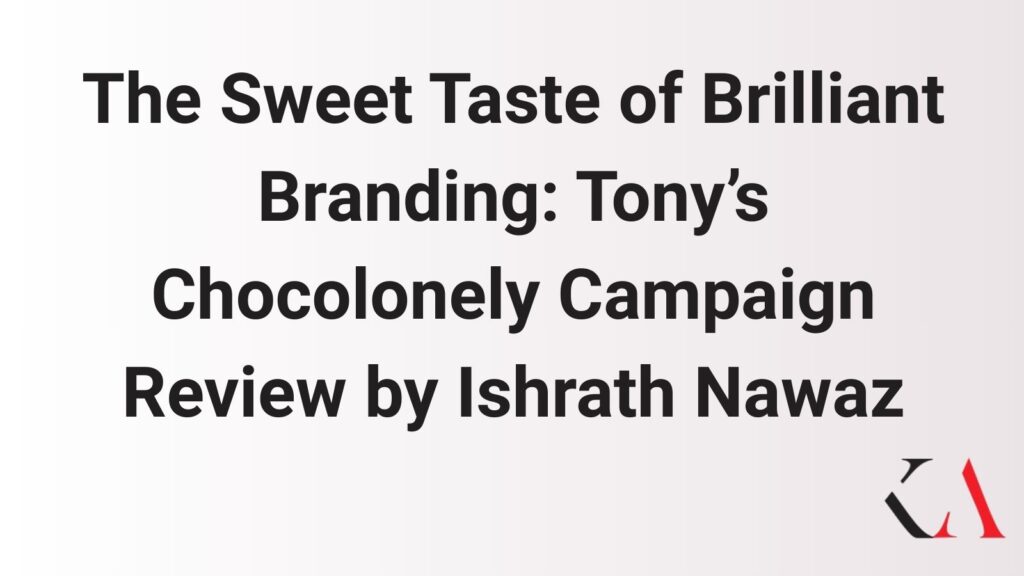The Sweet Taste of Brilliant Branding: Tony’s Chocolonely Campaign Review by Ishrath Nawaz

When I first came across Tony’s Chocolonely, I immediately thought: “This doesn’t look like any chocolate brand I’ve seen before.” The bright wrappers, the quirky name, and even the uneven chocolate pieces instantly stood out. But as I explored the brand further, I realized there’s a powerful strategy behind its unconventional choices.
In this Tony’s Chocolonely campaign review by Ishrath Nawaz, I’ll break down how the brand has turned chocolate into a tool for storytelling, awareness, and social impact—making it one of the most inspiring case studies in ethical marketing.
Design With a Mission at Its Core
At first glance, Tony’s bars look playful, but their design carries a deeper message. The chocolate is divided into uneven chunks to represent inequality in the cocoa industry. Large pieces symbolize the big corporations that take the majority of profits, while the tiny pieces represent the farmers who earn the least.
This creative decision ensures that every bar communicates the company’s mission. Instead of simply telling people about inequality, Tony’s allows consumers to experience it physically. That’s powerful branding—and a perfect example of how design can be used to drive awareness.
This observation is a key highlight in any Tony’s Chocolonely campaign breakdown, showing how even product design can reflect brand values.
Packaging That Educates and Inspires
For most chocolate brands, packaging is about attractive graphics and catchy slogans. For Tony’s Chocolonely, it’s much more than that. Every wrapper is an educational tool, explaining the brand’s fight against child labor, its mission to build a fair supply chain, and its vision for an ethical chocolate industry.
What’s brilliant here is that education doesn’t feel forced. Customers walk away not just with a bar of chocolate, but with new knowledge about where their product comes from and the impact it has on farmers.
In this Tony’s Chocolonely marketing campaign review, the packaging stands out as one of the brand’s smartest moves. It turns every sale into an opportunity to spread awareness—transforming casual buyers into informed advocates.
How Tony’s Chocolonely Positions Itself as a Rebel Brand
The chocolate industry is dominated by global giants like Cadbury, Nestlé, Lindt, and Hershey’s. Their branding often looks polished and predictable. Tony’s Chocolonely, however, takes the opposite approach.
From its bold colors to its unconventional name, Tony’s has crafted a “rebel identity” that immediately sets it apart. But this rebellious stance isn’t just about aesthetics—it’s tied to purpose. The company challenges the status quo by calling out unfair practices in cocoa farming and positioning itself as a brand that stands for justice.
This is why in any Tony’s Chocolonely awareness campaign review, you’ll see the same conclusion: the brand’s positioning isn’t just different, it’s authentic. And authenticity is what today’s conscious consumers value most.
What Brands Can Learn From Tony’s Chocolonely
The brilliance of Tony’s branding lies in its ability to merge ethics with marketing. The campaign shows us three powerful lessons:
- Purpose builds loyalty: By championing fairness, Tony’s creates an emotional connection that keeps customers coming back.
- Education drives impact: Packaging becomes a medium for storytelling and awareness, rather than just design.
- Differentiation matters: In a crowded market, bold choices make the brand instantly recognizable.
This Tony’s Chocolonely marketing campaign isn’t just about chocolate—it’s a masterclass in how companies can use branding to make a difference in the real world.
Why This Campaign Matters
What makes Tony’s stand out is that it doesn’t just say it cares about farmers, ethics, or fair trade—it demonstrates it in every detail of the brand experience. Consumers today are more aware than ever, and they gravitate toward brands that practice what they preach.
That’s why this Tony’s Chocolonely campaign review by Ishrath Nawaz resonates with marketers, entrepreneurs, and socially conscious consumers alike. Whether you come across it as a Tony’s Chocolonely campaign review by Ishrath, a Tony’s Chocolonely campaign review by Kabrand Consulting, or any other perspective, one thing remains clear: Tony’s has redefined what it means to use branding for good.
Final Thoughts
At its core, Tony’s Chocolonely proves that branding isn’t just about aesthetics—it’s about mission, storytelling, and real-world impact. From uneven chocolate bars to bold packaging and rebel positioning, the company has built more than a chocolate brand—it has built a movement.
This Tony’s Chocolonely campaign review demonstrates how creativity, purpose, and courage can reshape industries.